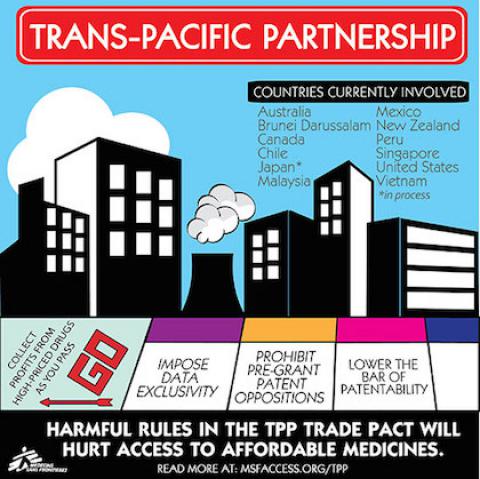The United States government continues to demand intellectual property provisions in the Trans-Pacific Partnership Agreement (TPP) that will limit access to medicines for at least half a billion people, said the international medical humanitarian organization Doctors Without Borders/Médecins Sans Frontières (MSF) on Monday as negotiators continued another round of secret meetings in New York.
“MSF and many others have repeatedly voiced concerns that the TPP is a looming disaster for people who rely on access to affordable generic medicines, both internationally and in the United States,” said Rohit Malpani, director of policy and analysis at the MSF Access Campaign. “Despite this outcry, the US continues to work behind closed doors, without any input from the public, experts, or elected officials, to aggressively push for intellectual property provisions that put the profits of pharmaceutical companies ahead of people’s health.”
If signed in its current form, the TPP—a far-reaching trade agreement involving the US and 11 other Pacific-Rim countries—would force all countries to grant additional drug patents, extending monopolies on medicines beyond 20 years, a practice called patent "evergreening."
The agreement would also impose an unprecedented extended period of exclusivity for clinical data required to prove the safety and efficacy of drugs and vaccines that are “biologic” products, extending monopolies in TPP countries, which will delay lower-cost versions of these medicines from entering the market.
“The intellectual property provisions of the TPP completely undermine the Administration’s stated public health goals, including its own goal to achieve an AIDS-free generation,” said Malpani. “While President Obama speaks of expanding health care and tackling issues of income inequality at home, he is actively promoting a trade agreement that will exacerbate economic disparities and endanger people’s health care worldwide.”
MSF has relied on leaks of the TPP text for information because the negotiations have been held in secret. While MSF and other civil society groups have been excluded from official negotiations on the TPP, industry groups representing various multinational corporations have had the opportunity to read the text and suggest revisions.
In the coming weeks, the US Congress could vote to renew “fast-track” authority on the TPP, which would allow the agreement to be put to an “up or down” vote without revision.
Renewal of fast-track authority without public health safeguards that mandate major revisions of the intellectual property chapter will all but ensure that these damaging provisions remain in the text.
“The TPP is the most damaging trade agreement we have ever seen in terms of access to medicines for poor people,” said Malpani. “With USTR [Office of the United States Trade Representative] publicly stating that these negotiations are winding down, it is now more urgent than ever that concerns about access to medicines be addressed."
[Read MSF's Open Letter to President Obama.]


Spread the word